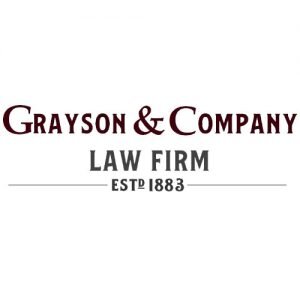Best Wage & Hour Lawyers in Moose Jaw
Share your needs with us, get contacted by law firms.
Free. Takes 2 min.
List of the best lawyers in Moose Jaw, Canada
About Wage & Hour Law in Moose Jaw, Canada
Wage & hour law refers to the rules and regulations that govern how employees are paid, their working conditions, and their entitlements regarding hours worked. In Moose Jaw, Saskatchewan, these laws are designed to ensure that workers receive fair compensation and are protected against exploitative practices. Most wage and hour rules in Moose Jaw derive from the Saskatchewan Employment Act and its regulations, which set standards for minimum wage, overtime, holidays, rest periods, and more.
Why You May Need a Lawyer
Legal advice in wage & hour matters can be crucial for both employees and employers. Common situations requiring legal assistance include unpaid wages or overtime, wrongful termination due to wage complaints, misclassification as an independent contractor, retaliation, confusion about entitlement to breaks or public holiday pay, or conflict about record-keeping and payslips. Employers may also require guidance to remain compliant and avoid costly penalties or disputes.
Local Laws Overview
Key wage & hour laws in Moose Jaw are set out by the Saskatchewan Employment Act and are enforced by the Saskatchewan Labour Relations Board and Employment Standards. Some important aspects include:
- Minimum Wage: Saskatchewan sets a provincial minimum wage, which is periodically reviewed and updated.
- Hours of Work: The standard work week is 40 hours or 8 hours per day. Overtime generally applies if these are exceeded unless exempted by occupation or agreement.
- Overtime Pay: Overtime is to be paid at 1.5 times the employee’s regular wage rate for hours worked beyond the standard hours.
- Statutory Holidays: Employees may be entitled to public holiday pay and special rates if required to work on these days.
- Rest Periods: Employees are entitled to rest breaks and a certain frequency of days off.
- Pay Statements: Employers must provide itemized pay statements each pay period.
- Record-Keeping: Employers must keep accurate payroll records for all employees.
- Equal Pay: There are provisions ensuring equal pay for equal work without gender-based discrimination.
Frequently Asked Questions
What is the current minimum wage in Moose Jaw, Saskatchewan?
As of 2024, the minimum wage in Saskatchewan is $14.00 per hour. This rate is subject to change, so it is wise to confirm the current wage with Saskatchewan Employment Standards.
When am I entitled to overtime pay?
Employees are entitled to overtime pay for hours worked beyond 8 hours per day or 40 hours per week at a rate of 1.5 times their regular hourly wage, unless specific exemptions apply.
Do salaried workers get overtime?
Some salaried workers qualify for overtime, while others may be exempt depending on the nature of their role and the terms of their employment. Exemptions are listed in the Saskatchewan Employment Act.
How often should I receive pay?
Employers are required to pay employees at least semi-monthly (every two weeks), unless otherwise agreed upon with the employee.
What should I do if my employer refuses to pay me?
First, attempt to resolve the issue with your employer in writing. If this does not work, file a formal complaint with Saskatchewan Employment Standards or seek legal advice.
Am I entitled to holiday pay?
Most employees qualify for statutory holiday pay and may also receive premium rates if they work on a statutory holiday, provided they meet eligibility requirements.
Can my employer make deductions from my pay?
Employers may only make deductions allowed by law or authorized in writing by the employee, such as taxes or benefits. Unauthorized deductions should be reported.
Do I get paid for breaks?
Meal breaks (typically 30 minutes every 5 hours of work) are unpaid, unless the employee must remain available for work. Short rest breaks may be paid at the employer’s discretion or by workplace policy.
What records should my employer keep?
Employers must maintain records of hours worked, wages paid, and any deductions for at least five years. Employees are entitled to receive an itemized pay statement every pay period.
How do I file a wage & hour complaint?
Complaints can be filed in writing with the Ministry of Labour Relations and Workplace Safety’s Employment Standards offices in Saskatchewan. Supporting documents like pay stubs and time sheets can help your case.
Additional Resources
If you need more information or support relating to wage & hour laws in Moose Jaw, consider these helpful resources:
- Saskatchewan Employment Standards - For comprehensive information about workplace rights and to file complaints.
- Saskatchewan Ministry of Labour Relations and Workplace Safety - Offers guidance on employment rights and standards.
- Saskatchewan Human Rights Commission - For discrimination or harassment concerns in the workplace.
- Legal Aid Saskatchewan - Provides legal assistance for those who qualify.
- Canadian Bar Association Saskatchewan Branch - Helps connect individuals with experienced employment lawyers.
Next Steps
If you believe your rights under wage & hour law have been violated in Moose Jaw, follow these steps:
- Collect and organize all employment records, including contracts, pay statements, time sheets, and correspondence with your employer.
- Try to resolve the issue directly with your employer, preferably in writing for documentation purposes.
- If the issue remains unresolved, contact Saskatchewan Employment Standards or another appropriate agency to file a complaint or seek guidance.
- Consider reaching out to a qualified employment lawyer who understands Saskatchewan law for advice tailored to your specific case, especially for complex or high-value matters.
- Keep a detailed record of all communication and steps taken during this process to support any claim you may need to make.
Lawzana helps you find the best lawyers and law firms in Moose Jaw through a curated and pre-screened list of qualified legal professionals. Our platform offers rankings and detailed profiles of attorneys and law firms, allowing you to compare based on practice areas, including Wage & Hour, experience, and client feedback.
Each profile includes a description of the firm's areas of practice, client reviews, team members and partners, year of establishment, spoken languages, office locations, contact information, social media presence, and any published articles or resources. Most firms on our platform speak English and are experienced in both local and international legal matters.
Get a quote from top-rated law firms in Moose Jaw, Canada — quickly, securely, and without unnecessary hassle.
Disclaimer:
The information provided on this page is for general informational purposes only and does not constitute legal advice. While we strive to ensure the accuracy and relevance of the content, legal information may change over time, and interpretations of the law can vary. You should always consult with a qualified legal professional for advice specific to your situation.
We disclaim all liability for actions taken or not taken based on the content of this page. If you believe any information is incorrect or outdated, please contact us, and we will review and update it where appropriate.









